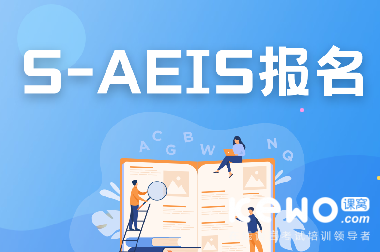AEIS语法笔记:重点难点虚拟语气

英语语法的学习在于更好的听、说、读、写等语言实践活动,因此对语法知识的掌握在AEIS备考学习中非常重要,不容忽视。今天课窝网继续分享AEIS语法笔记:虚拟语气。
一、语气
1.陈述语气:陈述一个事实或提出一种想法的语气。I don’t know anything about the accident.
2.疑问语气:用来提出问题或询问情况的语气。Do you have a camera?
3.祈使语气:用来向对方提出请求,邀请,给予忠告,指示,警告,命令等的语气。在祈使语气中,直接用动词原形,主语you一般省略。Come in and take a seat.
4.虚拟语气:表示一种假想或主观愿望。If I were you , I would forgive Mary.

二、虚拟语气在条件句中的用法
真实条件句
这种条件句实现的可能性非常大,常用 If, unless, once, as/so long as, on condition that来引导。
If I have time, I will go to America.
Unless they invite me, I will not go to the party.
虚拟条件句
1.对现在情况的虚拟
对现在情况的虚拟,条件句用一般过去时,主句谓语用“would/should/might/could+动词原形”。
If I were you, I would choose to work in a small town.
(事实是:我不可能是你,因此这只是一种假想)
If the weather were fine now, we would have a picnic.
(事实是:现在天气不好)
If I had a map now, we could easily get out of the forest.
(事实是:现在没有地图)
2.对过去情况的虚拟
对过去情况的虚拟,条件句用过去完成时,主句谓语用“would/should/might/could+have+过去分词”。
If you had come yesterday, you would have met Tony.
(事实是:你昨天没来)
If it had not been for your help yesterday, I could not have caught the bus.
(事实是:你昨天帮助我了)
3.对将来情况的虚拟
对将来情况的虚拟,条件句中谓语动词可用should do, were to do或动词的过去式三种形式,主句谓语用“would/should/might/could+动词原形”。
If I were to do the job, I would do it in a different way.
(事实是:我很可能不去做这项工作)
If you should have any difficulty in getting the information, you could come directly to my office. (事实是:你可能没有太大困难)
If it snowed tomorrow, our plan would be postponed.
(事实是:明天很可能不会下雪)
4.错综虚拟语气
有时条件从句表示的动作和主句表示的动作发生的时间不一致,这类句子称为错综虚拟语气。此时主从句的形式应根据各自所表示的时间进行调整。
If you had taken my advice then, you would not be in trouble now.
(if条件句是对过去的虚拟,故用过去完成时,而主句是对现在的虚拟,故用would do 形式)
If she were to leave , I would have heard about it.
(if条件句是对将来的虚拟,用were to do形式,而主句是对过去的虚拟,故用would have done形式)
5.含蓄虚拟语气
有时虚拟的条件并不是直接通过条件句来表示,而是用一些词或短语如without, but for, otherwise等或上下文暗示来说明,这种句子叫含蓄虚拟语气。
Without electricity (=if there were no electricity), the world would be dark.
But for your advice(=if it had not been for your advice), I would not have made such great progress.
特别提示:
虚拟条件句中有had, should, were时,可以把if去掉,然后把had, should, were提到主语前面,形成部分倒装。
If time were to go back/ Were time to go back, I would work harder.
If I had worked hard/ Had I worked hard, I would have surely succeeded.
If it should be fine tomorrow/Should it be fine tomorrow, we would go for an outing.
三、虚拟语气在名词性从句中的用法
1.宾语从句中的虚拟语气
1.1 wish后的宾语从句
wish后的宾语从句用一般过去时表示与现在相反的情况,用过去完成时表示与过去相反的情况,用would/could do表示与将来相反的情况。
I wish I lived on the seashore.
I wish you had come to the wedding yesterday.
I wish I could know the answer to the question tomorrow.
1.2 would rather后的宾语从句
would rather后的从句常用一般过去时表示与现在相反或将来相反的情况,用过去完成时表示与过去相反的情况。
I would rather you did not smoke.
I would rather you had not let out the secret.
1.3表示“建议,命令,要求”等动词后的宾语从句
表示“建议,命令,要求”等动词后的宾语从句谓语常用“should+动词原形”,有时候should可以省略。常这样的动词有insist, demand, desire, require, request, propose, suggest, advise, command, order, recommend.
I suggest you (should) have enough sleep.
My parents advise I (should) not watch too much TV.
We suggest that Tony (should) sing another song.
2.主语从句中的虚拟语气
在以下三种结构的主语从句中,谓语动词用“should+动词原形”,should可以省略。
It is/was important(necessary, appropriate, proper, vital) that...
It is/was unnatural(unthinkable, strange, surprising) that...
It is/was suggested(requested, required, ordered, proposed,decided) that..
3.表语从句中的虚拟语气
3.1 as if, as though引导的表语从句中的虚拟语气
as if, as though引导的表语从句中,用一般过去时表示与现在事实相反,用过去完成时表示与过去事实相反。
It looks as if he were drunk.
He seemed as if he had suffered a lot.
3.2 主语是表示“建议,要求,命令,主张”等意义的名词
当句子的主语是表示“建议,要求,命令,主张”的名词,如suggestion, proposal, advice,demand,order,requirement等,其后的表语从句谓语常用“should+动词原形”,should可以省略。
Our decision is that the meeting (should) be put off.
My suggestion is that we (should) walk home instead of taking a taxi.
4.同位语从句中的虚拟语气
表示“主张,要求,建议,命令”名词如suggestion, proposal, advice, demand, order, requirement等后的同位语从句的谓语常用“(should+)动词原形”结构。
He made a suggestion that they (should) hold an English speech contest.
The requirement that students (should) learn to protect themselves is successfully carried out in most schools.
四、虚拟语气在状语从句中的用法
1.方式状语从句中的虚拟语气
as if, as though引导状语从句有时也可表示与事实相反的情况。用一般过去时表示与现在事实相反,用过去完成时表示与过去事实相反。
He speaks English as if he had learned it in America.(事实是:他的英语不是在美国学的)
She closes her eyes as if she was tired.(事实是:她并不累)
2.目的状语从句中的虚拟语气
引导目的状语从句的短语为in order that, so that, for fear that等,从句中谓语常用“should(may, might, can, could, would等)+动词原形”。
He raised his hand up so that he could be seen.
He left early in order that the children would not be alone in the house.
五、虚拟语气的其他用法
1.It is (high) time that...句型
这个句型表示“该做……”,其后的从句要用虚拟语气,通常用一般过去时,有时也可以用“should+动词原形”。
It’s time that we started off. 我们该出发了。
It’s high time that we should have a rest. 我们该休息了。
2.If only 句型
这个句型表示“要是……就好了”,其后虚拟语气的用法如下:用一般过去时表示与现在事实相反,用过去完成时表示与过去事实相反。
If only I were younger. 要是我年轻点就好了。
If only I had written his phone number. 要是我记下他的电话号码就好了。
以上就是小编为大家介绍的关于AEIS语法考点中的虚拟语气,内容较多,大家要多多练习。更多AEIS考试官网、AEIS考试流程等问题,可以咨询我们。


上一篇: AEIS作文专题:中间段写法之列举法
猜你喜欢

利用暑假冲刺政府学校!咱们用真实案例说话
 2024.04.24
2024.04.24

剑桥KET、PET、FCE全解析,一篇文章轻松搞定!
 2024.04.18
2024.04.18

新加坡政府学校入学,AEIS考试是什么?一篇说清楚!
 2024.04.02
2024.04.02

2024年2月S-AEIS已经开始报名!最全攻略助您顺利报考!
 2024.01.10
2024.01.10

